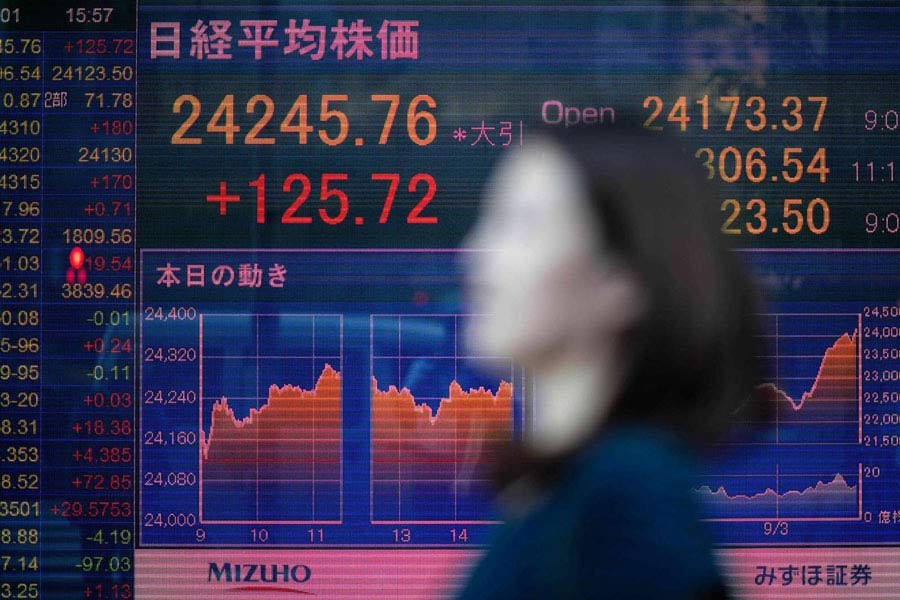Linking Asia's financial markets will help to overcome the next crisis

Satoru Yamadera and Peter Rosenkranz
Published :
Updated :

Just as past crises triggered international and regional financial cooperation, the pandemic offers an opportunity to collectively improve financial resilience and soundness.
The Covid-19 pandemic has underscored the need to strengthen the global financial safety net - the various institutional arrangements and mechanisms that are designed to provide financial support and liquidity at times of market stress. Financial markets are increasingly interconnected across borders, but unlike domestic markets, there is no global "lender of last resort" that can provide funding for financial institutions to prevent a financial crisis.
In March 2020, global financial markets unraveled amid fears of a global recession and the desire to reduce risk. Fortunately, markets have recovered thanks to efforts by central banks to inject ample liquidity. Particularly, coordinated efforts among central banks to secure U.S. dollar funding with currency swap and repurchase arrangements with the U.S. Federal Reserve gave comfort to financial institutions, as they could quickly access foreign currency to meet their short-term funding needs.
Those efforts, however, may create another risk: overreliance on the Federal Reserve. Financial institutions engaging in cross-border activities increasingly expect the U.S. central bank to prop up global markets, but the central bank's priority is to respond to domestic financial and economic conditions. Meanwhile, differences in the pace of Covid-19 vaccinations mean that some economies will recover slower than others, with emerging economies particularly vulnerable to delays. A fast U.S. recovery could lead to a repeat of the 2013 "taper tantrum," when rising U.S. bond yields sparked capital flight from emerging markets in Asia and elsewhere.
To reduce overreliance on the Federal Reserve and the risk of another taper tantrum, we need to strengthen the global financial safety net with new institutional arrangements and infrastructures. Among the arrangements we should pursue are linkages between central banks and securities depositories to enable faster access to local currency funding, such as the recently announced link between the Bank of Japan and the Hong Kong Monetary Authority, developed under the Asian Bond Markets Initiative. The initiative is led by the Association of Southeast Asian Nations plus the People's Republic of China, Japan, and the Republic of Korea, collectively known as ASEAN+3.
The growing financial interconnectedness of economies in Asia underscores why such institutional links are important, as they can help mitigate the risk that financial turmoil in one market spills over into others. More than half of all trade in the ASEAN+3 markets takes place within the region, and regional cross-border banking is growing.
The development of long-term local currency bond markets has helped the ASEAN+3 region overcome the so-called "double mismatch" problem, which arises when institutions borrow short-term in foreign currencies and lend long-term in local currencies, putting their balance sheets at increased risk from currency fluctuations and duration mismatch. The region's local currency bond markets have grown more than 25-fold since the 1997 Asian financial crisis to a combined $20 trillion. Thanks to the efforts of the ASEAN+3 governments, financial institutions in the region have already accumulated government bonds as high-quality liquid assets.
More than half of all trade in ASEAN+3 markets takes place within the region, and regional cross-border banking is growing.
Still, mismatches between payment and revenue currencies, as well as lending and funding currencies, remain a potential risk. Trade invoices and cross-border transactions are primarily in U.S. dollars. In addition, foreign banks' local operations are funded mainly by U.S. dollars, while their lending is shifting to local currencies as more customers prefer local currency borrowing to match their increasingly consumer-based revenue. This mismatch is common worldwide, except in the U.S. But the problem may be especially acute in ASEAN+3, because the region's economies are so highly interdependent yet lack a single currency, like that of the euro area.
To help financial institutions access funds while reducing the mismatch risk, the Asian Bond Markets Initiative aims to develop links among the ASEAN+3 central banks' real time gross settlement systems (RTGS) and central securities depositories (CSD), known as the CSD-RTGS linkages. On 1 April this year, the Bank of Japan and the Hong Kong Monetary Authority announced the first cross-border, cross-currency "delivery-versus-payment" link under the initiative. The link lets banks obtain funds in Hong Kong dollars immediately by using Japanese government bonds as collateral, using a short-term borrowing mechanism known as a repurchase or "repo" agreement. Previously, simultaneous delivery of Hong Kong dollars and Japanese government bonds was not possible, because cross-border transactions are normally executed through a chain of command of correspondent banking networks.
Such links should be replicated across Asian markets. They add to the regional financial safety net because they don't require U.S. dollar funding. Lenders need not worry about the credit risk of borrowers, because a loss will be covered by the collateral. In turn, borrowers can find lenders more easily. The links are especially effective when market confidence is deteriorating. By allowing banks to swiftly access foreign currency in exchange for their local-currency bond holdings, these links can help reduce the buildup of financial stress.
There are still challenges ahead. Currently, only limited types of government bonds are recognized as eligible collateral. Particularly, central banks are reluctant to accept foreign currency-denominated bonds. Given the greater connectedness of financial markets in the region, the central banks and financial institutions need to revisit their practices.
Just as past crises triggered international and regional financial cooperation, the Covid-19 pandemic offers an opportunity to collectively improve financial resilience and soundness. Hopefully, the arrangement between the Bank of Japan and the Hong Kong Monetary Authority can be the first step to increased links between financial market infrastructures in Asia.
The piece is excerpted from Asian Development Blog www.blogs.adb.org


 For all latest news, follow The Financial Express Google News channel.
For all latest news, follow The Financial Express Google News channel.